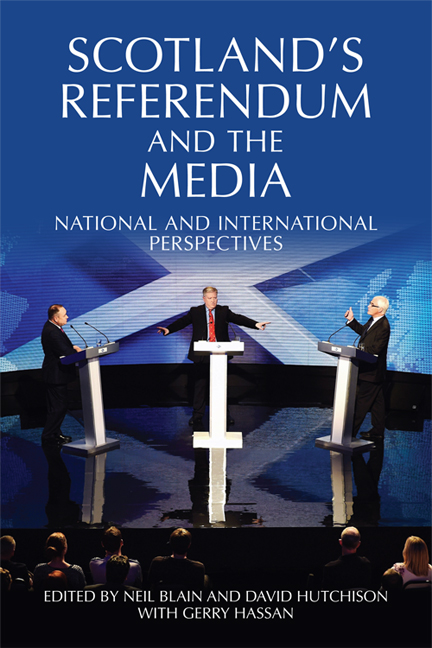Book contents
- Frontmatter
- Contents
- Preface
- Part One The Referendum in Scotland
- 1 The Unexpected Campaign
- 2 The Media Landscape in Scotland
- 3 Broadcasting and the Press: Some Key Moments
- 4 Scotland's Changing ‘Community of the Communicators’: The Political Commentariat and the Independence Referendum
- 5 The Scottish Press Account: Narratives of the Independence Referendum and its Aftermath
- 6 Scottish TV Coverage of the Referendum Campaign from September 2012 to September 2014
- 7 ‘Liked’, ‘Shared’, Re-tweeted: The Referendum Campaign on Social Media
- 8 Sport, Gender and National Identities
- Part Two Views from the UK
- Part Three International Perspectives
- Notes on the Contributors
- Index
6 - Scottish TV Coverage of the Referendum Campaign from September 2012 to September 2014
from Part One - The Referendum in Scotland
Published online by Cambridge University Press: 05 August 2016
- Frontmatter
- Contents
- Preface
- Part One The Referendum in Scotland
- 1 The Unexpected Campaign
- 2 The Media Landscape in Scotland
- 3 Broadcasting and the Press: Some Key Moments
- 4 Scotland's Changing ‘Community of the Communicators’: The Political Commentariat and the Independence Referendum
- 5 The Scottish Press Account: Narratives of the Independence Referendum and its Aftermath
- 6 Scottish TV Coverage of the Referendum Campaign from September 2012 to September 2014
- 7 ‘Liked’, ‘Shared’, Re-tweeted: The Referendum Campaign on Social Media
- 8 Sport, Gender and National Identities
- Part Two Views from the UK
- Part Three International Perspectives
- Notes on the Contributors
- Index
Summary
Media coverage of the Scottish referendum campaign in 2012–14 has attracted a great deal of claim and counter-claim regarding alleged imbalance and bias. The research presented here, which was carried out with the help of three colleagues, is an assessment of the extent to which the BBC and to a lesser extent ITV/STV met the commonly agreed standards of fairness and impartiality deemed to be central to public service broadcasting in the United Kingdom, and which are regularly reiterated in BBC and Ofcom codes of practice.
Both television and radio news broadcasting were considered in the research.
Television News
The survey of TV coverage of the referendum campaigns reported here covers the period from 17 September 2012 to 18 September 2013 and includes every weekday evening (6–7 p.m.) news broadcast by BBC 1, Reporting Scotland, ITV and STV, and shorter weekend broadcasts in that period. A total, therefore, of approximately 640 hours, minus advertising breaks in ITV and STV broadcasts, was watched, transcribed and coded. The evening TV programmes were chosen as the news broadcasts with the largest audiences in Scotland and in the UK. The distribution and quantity of messages of different types are presented in a tabular format with selected text examples to illustrate types of message.
Our purpose was to answer the following questions, which emerged as salient issues from first and second readings of the transcripts:
1. How prevalent were referendum topics in the first year of the campaigns?
2. What was the relative balance of statements given to the views of Yes and No representatives, arguments and evidence?
3. What was the relative balance of independent, scientific or academic evidence presented in support of the Yes and No campaigns?
4. To what extent did No arguments precede the Yes ones and vice versa?
5. What was the ratio of arguments finishing broadcasts unchallenged in favour of the Yes and No campaigns?
6. To what extent were arguments equated with the apparently personal wishes of political personalities rather than as collective positions?
7. What was the relative balance of offensive statements made to Yes and No campaigners and broadcast?
8. What forms of evidence dominated the discourse – economic, political, social?
9. Overall, and to what extent, did reporting favour the Yes or No campaign?
- Type
- Chapter
- Information
- Scotland's Referendum and the MediaNational and International Perspectives, pp. 59 - 69Publisher: Edinburgh University PressPrint publication year: 2016



